句子成分与句子结构
- 格式:ppt
- 大小:272.00 KB
- 文档页数:40
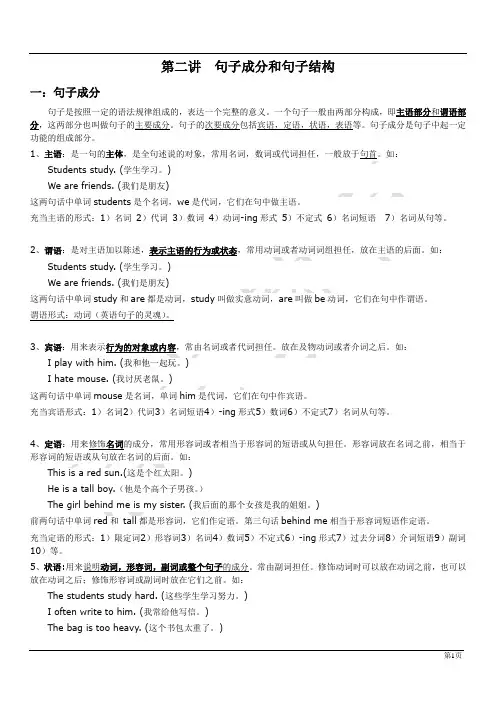
第二讲句子成分和句子结构一:句子成分句子是按照一定的语法规律组成的,表达一个完整的意义。
一个句子一般由两部分构成,即主语部分和谓语部分,这两部分也叫做句子的主要成分。
句子的次要成分包括宾语,定语,状语,表语等。
句子成分是句子中起一定功能的组成部分。
1、主语:是一句的主体,是全句述说的对象,常用名词,数词或代词担任,一般放于句首。
如:Students study. (学生学习。
)We are friends. (我们是朋友)这两句话中单词students是个名词,we是代词,它们在句中做主语。
充当主语的形式:1)名词2)代词3)数词4)动词-ing形式5)不定式6)名词短语7)名词从句等。
2、谓语:是对主语加以陈述,表示主语的行为或状态,常用动词或者动词词组担任,放在主语的后面。
如:Students study. (学生学习。
)We are friends. (我们是朋友)这两句话中单词study和are都是动词,study叫做实意动词,are叫做be动词,它们在句中作谓语。
谓语形式:动词(英语句子的灵魂)。
3、宾语:用来表示行为的对象或内容,常由名词或者代词担任。
放在及物动词或者介词之后。
如:I play with him. (我和他一起玩。
)I hate mouse. (我讨厌老鼠。
)这两句话中单词mouse是名词,单词him是代词,它们在句中作宾语。
充当宾语形式:1)名词2)代词3)名词短语4)-ing形式5)数词6)不定式7)名词从句等。
4、定语:用来修饰名词的成分,常用形容词或者相当于形容词的短语或从句担任。
形容词放在名词之前,相当于形容词的短语或从句放在名词的后面。
如:This is a red sun.(这是个红太阳。
)He is a tall boy.(他是个高个子男孩。
)The girl behind me is my sister. (我后面的那个女孩是我的姐姐。
)前两句话中单词red和tall都是形容词,它们作定语。
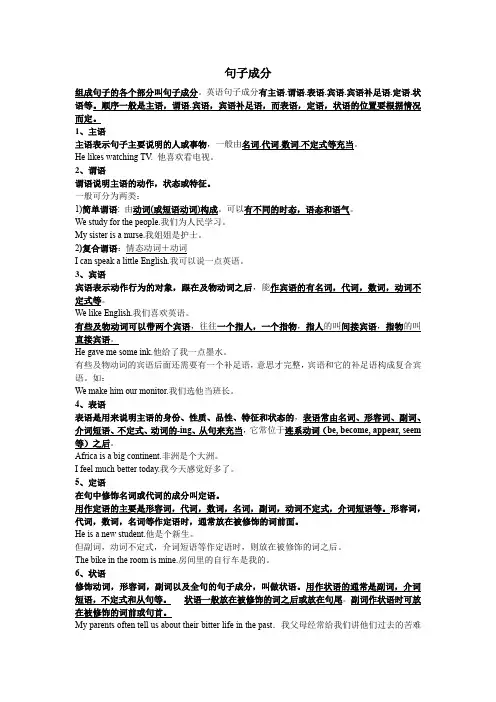
句子成分组成句子的各个部分叫句子成分。
英语句子成分有主语.谓语.表语.宾语.宾语补足语.定语.状语等。
顺序一般是主语,谓语.宾语,宾语补足语,而表语,定语,状语的位置要根据情况而定。
1、主语主语表示句子主要说明的人或事物,一般由名词.代词.数词.不定式等充当。
He likes watching TV. 他喜欢看电视。
2、谓语谓语说明主语的动作,状态或特征。
一般可分为两类:1)简单谓语: 由动词(或短语动词)构成。
可以有不同的时态,语态和语气。
We study for the people.我们为人民学习。
My sister is a nurse.我姐姐是护士。
2)复合谓语:情态动词+动词I can speak a little English.我可以说一点英语。
3、宾语宾语表示动作行为的对象,跟在及物动词之后,能作宾语的有名词,代词,数词,动词不定式等。
We like English.我们喜欢英语。
有些及物动词可以带两个宾语,往往一个指人,一个指物,指人的叫间接宾语,指物的叫直接宾语。
He gave me some ink.他给了我一点墨水。
有些及物动词的宾语后面还需要有一个补足语,意思才完整,宾语和它的补足语构成复合宾语。
如:We make him our monitor.我们选他当班长。
4、表语表语是用来说明主语的身份、性质、品性、特征和状态的,表语常由名词、形容词、副词、介词短语、不定式、动词的-ing、从句来充当,它常位于连系动词(be, become, appear, seem 等)之后。
Africa is a big continent.非洲是个大洲。
I feel much better today.我今天感觉好多了。
5、定语在句中修饰名词或代词的成分叫定语。
用作定语的主要是形容词,代词,数词,名词,副词,动词不定式,介词短语等。
形容词,代词,数词,名词等作定语时,通常放在被修饰的词前面。

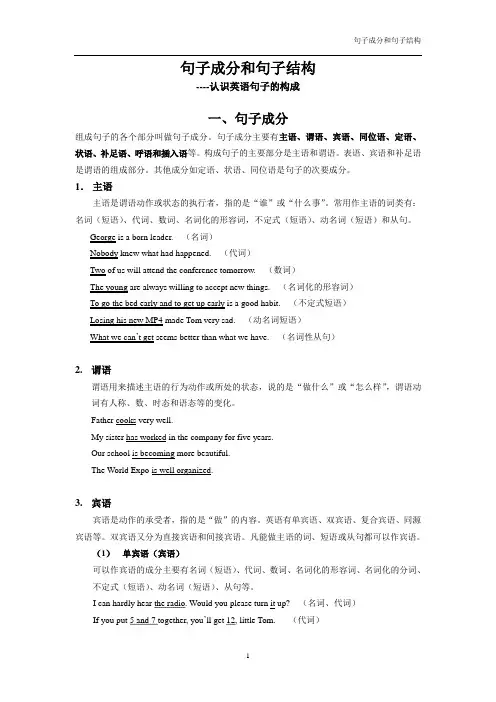
句子成分和句子结构----认识英语句子的构成一、句子成分组成句子的各个部分叫做句子成分。
句子成分主要有主语、谓语、宾语、同位语、定语、状语、补足语、呼语和插入语等。
构成句子的主要部分是主语和谓语。
表语、宾语和补足语是谓语的组成部分。
其他成分如定语、状语、同位语是句子的次要成分。
1.主语主语是谓语动作或状态的执行者,指的是“谁”或“什么事”。
常用作主语的词类有:名词(短语)、代词、数词、名词化的形容词,不定式(短语)、动名词(短语)和从句。
George is a born leader. (名词)Nobody knew what had happened. (代词)Two of us will attend the conference tomorrow. (数词)The young are always willing to accept new things. (名词化的形容词)To go the bed early and to get up early is a good habit. (不定式短语)Losing his new MP4 made Tom very sad. (动名词短语)What we can’t get seems better than what we have. (名词性从句)2.谓语谓语用来描述主语的行为动作或所处的状态,说的是“做什么”或“怎么样”,谓语动词有人称、数、时态和语态等的变化。
Father cooks very well.My sister has worked in the company for five years.Our school is becoming more beautiful.The World Expo is well organized.3.宾语宾语是动作的承受者,指的是“做”的内容。
英语有单宾语、双宾语、复合宾语、同源宾语等。
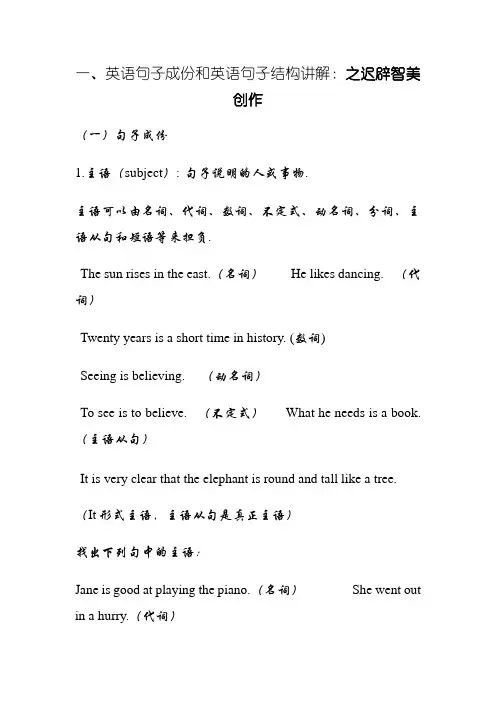
一、英语句子成份和英语句子结构讲解:之迟辟智美创作(一)句子成份1.主语(subject): 句子说明的人或事物.主语可以由名词、代词、数词、不定式、动名词、分词、主语从句和短语等来担负.The sun rises in the east.(名词)He likes dancing. (代词)Twenty years is a short time in history. (数词)Seeing is believing. (动名词)To see is to believe. (不定式)What he needs is a book. (主语从句)It is very clear that the elephant is round and tall like a tree.(It形式主语,主语从句是真正主语)找出下列句中的主语:Jane is good at playing the piano.(名词)She went out in a hurry.(代词)Four plus four is eight.(数词)To see is to believe.(不定式)Smoking is bad for health.(动名词)The young should respect the old.(名词化的形容词)What he has said is true. (句子)2.谓语(predicate): 说明主语的举措、状态和特征.简单谓语:由动词或动词词组组成I saw the flag on the top of the hill?He looked after two orphans.复合谓语:由情态动词或助动词+动词;He can speak English well.She doesn’t seem to like dancing.找出下列句中的谓语(注:只有动词才可作谓语.):1. We love China.2. We have finished reading this book.3. He can speak English.4. She seems tired.3.表语(predicative): 系动词之后的成份,暗示主语的性质、状态和特征.He is a teacher. (名词)Seventy-four! You don’t look it. (代词)Five and five is ten. (数词)He is asleep. (形容词)His father is in. (副词)The picture is on the wall. ( 介词短语)My watch is gone / missing / lost. (形容词化的分词)To w ear a flower is to say “I’m poor, I can’t buy a ring. (不定式)The question is whether they will come. (表语从句)★(罕见的系动词有: be, sound(听起来), look(看起来), feel(摸起来,smell(闻起来),taste(尝、吃起来), remain(坚持,仍是), feel(感觉) ... It sounds a good idea. The sound sounds strange. Her voice sounds sweet. Tom looks thin.The food smells delicious. The food tastes good.The door remains open. Now I feel tired.找出下列句中的表语.1. I am a teacher.2. They are on the playground.3. My job is teaching English.4. It gets cold.5. It sounds interesting.4.宾语:1)举措的接受者-----及物动词或介词的宾语I like China. (名词)He hates you. (代词)How many do you need? We need two. (数词)We should help the old and the poor. I enjoy working with you. (动名词)I hope to see you again. (不定式)Did you write down what he said? (宾语从句)2)介词后的名词、代词和动名词-----介宾Are you afraid of the snake? Under the snow, there are many rocks.3)双宾语-----间宾(指人)和直宾(指物)宾语分为直接宾语和间接宾语.直接宾语指物或事,间接宾语指人或植物.He gave me a book yesterday. Give the poor man somemoney.指出下面句子的间接宾语和直接宾语:please pass me the book.He bought his girlfriend some flowers.找出下列句子的宾语部份:1. We often help him.2. He likes to play basketball.3. We enjoy listening to the music.4. She said that he felt sick.5. They are talking about the new student.5.宾补:对宾语的弥补,全称为宾语补足语.有些及物动词除有一个直接宾语以外,还要有一个宾语补足语,说明宾语的身份和状态以弥补其意义缺乏,使句子的意义完整.这类经常使用的及物动词有:We elected him monitor. (名词)We all think it a pity that she didn’tcome here. (名)We will make them happy. (形容词)We found nobody in. ( 副词)Please make yourself at home. 介词短语)Don’t let him do that. (省to不定式)His father advised him to teach the lazy boy a lesson. (带to不定式)Don’t keep the lights burning. (现在分词)I’ll have my bike repaired. (过去分词)6.主补:对主语的弥补,全称为主语补足语.He was elected monitor. She was found singing in the next room.He was advised to teach the lazy boy a lesson.7.定语:修饰或限制名词或代词的词、词组或句子.Ai Yanling is a chemistry teacher.(名词)He is our friend. (代词)We belong to the third world. (数词)He was advised to teach the lazy boy a lesson.(形容词)The man over there is my old friend.(副词)The woman with a baby in her arms is my sister. (介词)The boys playing football are in Class 2. (现在分词)The trees planted last year are growing well now. (过去分词)I have an idea to do it well. (不定式)You should do everything that I do. (定语从句)定语后置:如果定语是由一个单词暗示时,通常要前置.而由一个词组或一个句子暗示时,通常则后置The girl in red is his sister.We have a lot of work to do.The girl standing under the tree is his daughter.Do you know the man who spoke just now?8.状语:用来修饰v., adj., adv., 或句子.暗示时间、地址、原因、结果、水平、条件、方式和让步. (以下例句按上述顺序排列)I will go there tomorrow.The meeting will be held in the meeting-room.The meat went bad because of the hot weather.He studies hard to learn English well.He didn’t stu dy hard so that he failed in the exam. I like some of you very much.If you study hard, you will pass the exam. He goes to school by bike.Though he is young, he can do it well.(二)句子结构简单句的五个基本句型1.主语+不及物动词She came./ My head aches.2.主语+及物动词+宾语She likes English.3.主语+系动词+表语She is happy.4.主语+双宾动词+间接宾语+直接宾语She gave John a book.5.主语+宾补动词+宾语+宾语补语She makes her mother angry.The teacher asked me to read the passage.★There +be 句型There are some books on the desk.There lies a book on the desk.Exercises :分析下列句子成份1. Our school is not far from my home.2. It is a great pleasure to talk with you3. All of us considered him honest.4. My grandfather bought me a pair of sports shoes.5. He broke a piece of glass.6. He made it clear that he would leave the city.翻译练习:主谓结构(主语+不及物动词)1、你应该努力学习You should study hard.2、他昨天晚上很晚回家She went home very late yesterday evening.练习:1、This box weighs five kilos. 这个盒子重五公斤.2、I lived in Beijing five years ago. 五年前我住在北京.主谓宾结构(主语+及物动词+宾语)1、我昨晚写了一封信I wrote a letter last night.2、我今天下午想和你谈谈I want to talk with you this afternoon.练习:1、All of us believe that Jack is an honest boy. 我们年夜家都相信Jack 是一个诚笃男孩.2、He did not know what to say. 他不知道说什麽好.主系表结构(主语+系动词+表语)1.我的弟弟都是年夜学生My brothers are all college students.2.在冬季,白天很短夜晚很长In winter, the days are short and the nights are long.3. 布朗女士看上去很健康Mrs Brown looks very healthy.4.在他15岁那年他成了著名的画家At the age of fifteen he became a famous pianist.练习:1、树叶已经变黄了.The leaves have turned yellow.2、这个陈说听起来很有意思.The report sounds interesting.双宾语结构(主语+双宾动词+间接宾语+直接宾语)1.强森先生去年叫我们德语Mr Johnson taught us German last year.2.祖父昨晚给我讲了一个有趣的故事Grandma told me an interesting story last night.练习:1、请你给我弄一本新的,好吗?Will you please get me a new copy?2、我替你叫辆出租汽车好吗?Shall I call you a taxi?复合宾语结构(主语+动词+宾语+宾语补足语)1.我们叫她爱丽丝We call her Alice.2.他父母叫他约翰His parents named him John.练习:1、学校定了一条规则,开始上课时学生要起立.The school made it a rule that the students should stand up when class begins.2、我认为与那个人谈话是无益的.I thought it no use talking with that manThere be 句型1.今晚不会开会There isn’t going to be a meeting tonight.2.这个村落里只有一口井There was only a well in the village.练习:1、铃响了.There goes the bell2、一周有七天.There are seven days a week二、英语句子种类讲解:依照句子的用途,英语句子可分为陈说句、疑问句、祈使句和感叹句.依照句子的结构,英语句子可分为简单句、并列句和复合句.中考对句子的考查主要集中在以下几个方面:1. 陈说句的构成形式及基本用法;2. 祈使句的构成形式及基本用法;3. 一般疑问句、特殊疑问句、选择疑问句、反意疑问句的构成形式及基本用法;4. 由what, how引导的感叹句的构成形式、用法及区别对各种从句的用法我们在后面分别论述.(一.) 陈说句的构成形式及基本用法1. 陈说句:陈说句是用来陈说一个事实或表达说话人看法(包括肯定和否定)的句子.通经常使用降调,句末用句号“.”. Tom has a new car.The flower isn’t beautiful.2. 陈说句否定式的构成(1) 如果肯定陈说句的谓语部份含有助动词、情态动词或连系动词be,则只需在这些动词后加not即可构成否定式.He is playing the guitar.(肯定)He is not playing the guitar.(否定)We can get there before dark.(肯定)We can’t get thee before dark.(否定)(2) 如果陈说句的谓语动词是实义动词,而其中又没有情态动词或助动词时,则需根据人称和时态在该实义动词前加don’t, doesn’t或didn’t.同时把该实义动词酿成原形.He plays the violin well.(肯定)He doesn’t play the violin well.(否定)She won the game.(肯定)She didn’t win the game.(否定)(3) 如果句子是there be结构或谓语动词是have(有),除be和have之后加not之外,句中如果有some要酿成any.例如:There is some water in the cup. →There is not any water in the cup.He has some books. →He has not any books.(4) 除not以外,否定词no, never, nothing, nobody, few等也可构成否定句.例如:There is something wrong with his bike. →There is nothing wrong with his bike.I have seen the film. →I have never seen the film.(二.) 祈使句的构成形式及基本用法祈使句是用来暗示命令、请求、建议、号召等的句子,谓语动词用原形,句末用感叹号“!”或句号“.”.朗读时一般用降调.1.肯定的祈使句:(1)祈使句主语是you时,you常省略,但如果要特别强调对方或表达某种强烈的情绪时可以有主语或称号语.Be quiet.You be quiet!(2)“Do+祈使句”暗示一种强烈的感情或请求,do起强调作用.Do come back at once! Do be careful.(3)please用在祈使句中可以暗示一种客气的语气,但please 用在句末时,必需用逗号与其余部份分开.Open the window, please.(4)Let引导祈使句时,后面需跟上人称代词或称号语,人称代词一般只用第一、第三人称.Let Jack wait a minute.Let’s go to school.(5)在祈使句中,Let’s和Let us是有区另外.Let’s包括说话者,而Let us不包括听话者在内.这点从反意疑问句时可明显看出.Let’s go skating, shall we?(暗示内部的建议)Let us try again, will you?(暗示向他人发出请求)2. 否定祈使句通常以Don’t或Never开头.其结构通常是:“Don’t(Never)+动词原形+其他成份” 例如:Don’t do that again!Never leave today’s work for tomorrow! Don’t be late next time!(三.) 一般疑问句、特殊疑问句、选择疑问句、反意疑问句的构成形式及基本用法1. 一般疑问句:(1)一般疑问句的肯定形式一般疑问句一般是指以助动词、情态动词、be动词或have (有)开始,通常要求以yes,或no来回答的疑问句,一般疑问句读时通经常使用升调.Do you know Mr. Smith Can you swim?(2)一般疑问句的否定结构①在一般疑问句的否定结构中,把副词not放在一般疑问句的主语之后.但如果用not的简略形式-n’t,则须将-n’t与一般疑问句句首的be, have,助动词或情态动词写在一起.在实际运用中,一般都采纳简略式.Are you not a football fan?Aren’t you a football fan?Will she not like it?Won’t she like it?②与汉语分歧的是,英语一般疑问句否定结构的答语是否定还是肯定,全由答语的否定或肯定来决定.若答语是肯定的,则用yes加肯定结构;若答语是否定的,则用no加否定结构.Aren’t you a football fan? 你不是足球迷吗?Yes, I am.\ No, I am not.Won’t she like it?Yes, she will. \ No, she won’t.。
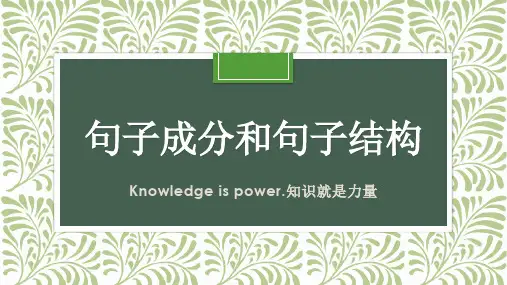
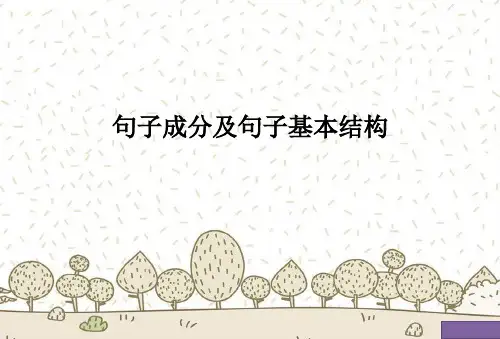
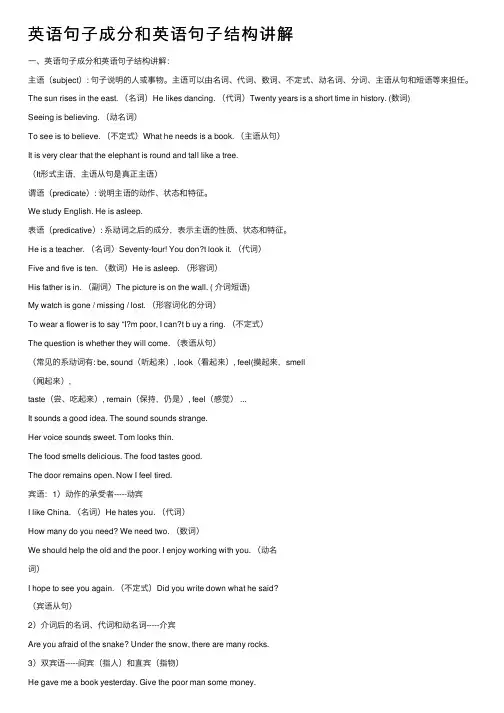
英语句⼦成分和英语句⼦结构讲解⼀、英语句⼦成分和英语句⼦结构讲解:主语(subject): 句⼦说明的⼈或事物。
主语可以由名词、代词、数词、不定式、动名词、分词、主语从句和短语等来担任。
The sun rises in the east. (名词)He likes dancing. (代词)Twenty years is a short time in history. (数词)Seeing is believing. (动名词)To see is to believe. (不定式)What he needs is a book. (主语从句)It is very clear that the elephant is round and tall like a tree.(It形式主语,主语从句是真正主语)谓语(predicate): 说明主语的动作、状态和特征。
We study English. He is asleep.表语(predicative): 系动词之后的成分,表⽰主语的性质、状态和特征。
He is a teacher. (名词)Seventy-four! You don?t look it. (代词)Five and five is ten. (数词)He is asleep. (形容词)His father is in. (副词)The picture is on the wall. ( 介词短语)My watch is gone / missing / lost. (形容词化的分词)To wear a flower is to say “I?m poor, I can?t b uy a ring. (不定式)The question is whether they will come. (表语从句)(常见的系动词有: be, sound(听起来), look(看起来), feel(摸起来,smell(闻起来),taste(尝、吃起来), remain(保持,仍是), feel(感觉) ...It sounds a good idea. The sound sounds strange.Her voice sounds sweet. Tom looks thin.The food smells delicious. The food tastes good.The door remains open. Now I feel tired.宾语:1)动作的承受者-----动宾I like China. (名词)He hates you. (代词)How many do you need? We need two. (数词)We should help the old and the poor. I enjoy working with you. (动名词)I hope to see you again. (不定式)Did you write down what he said?(宾语从句)2)介词后的名词、代词和动名词-----介宾Are you afraid of the snake? Under the snow, there are many rocks.3)双宾语-----间宾(指⼈)和直宾(指物)宾补:对宾语的补充,全称为宾语补⾜语。
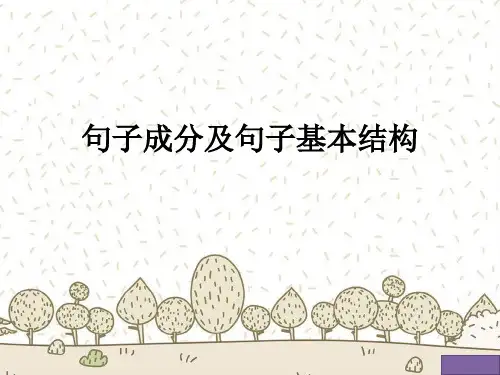
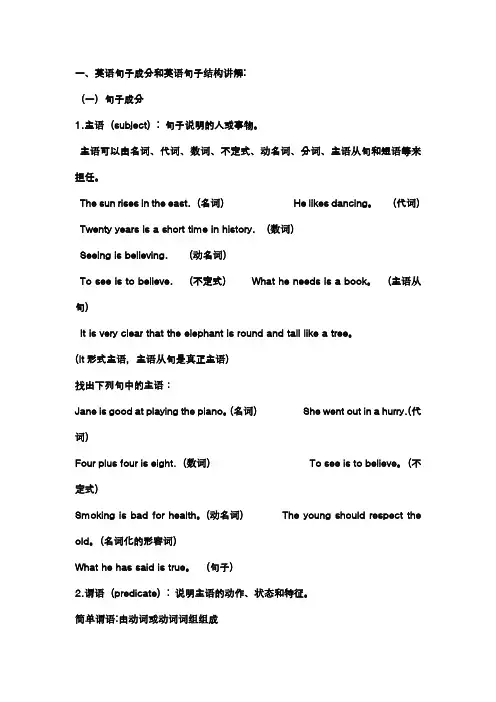
一、英语句子成分和英语句子结构讲解:(一)句子成分1.主语(subject): 句子说明的人或事物。
主语可以由名词、代词、数词、不定式、动名词、分词、主语从句和短语等来担任。
The sun rises in the east.(名词)He likes dancing。
(代词)Twenty years is a short time in history. (数词)Seeing is believing. (动名词)To see is to believe. (不定式)What he needs is a book。
(主语从句)It is very clear that the elephant is round and tall like a tree。
(It形式主语,主语从句是真正主语)找出下列句中的主语:Jane is good at playing the piano。
(名词)She went out in a hurry.(代词)Four plus four is eight.(数词)To see is to believe。
(不定式)Smoking is bad for health。
(动名词) The young should respect the old。
(名词化的形容词)What he has said is true。
(句子)2.谓语(predicate): 说明主语的动作、状态和特征。
简单谓语:由动词或动词词组组成I saw the flag on the top of the hill?He looked after two orphans。
复合谓语:由情态动词或助动词+动词;He can speak English well.She doesn’t seem to like dancing。
找出下列句中的谓语(注:只有动词才可作谓语。
):1. We love China。
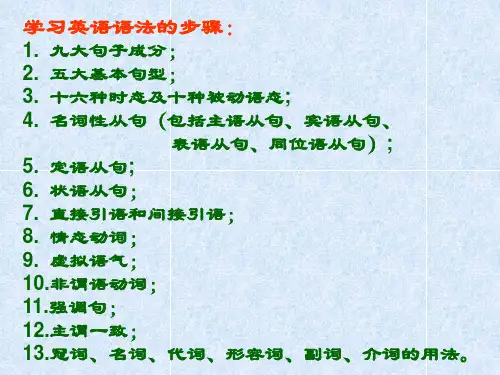
句子成分和句子结构
句子成分是指句子中的各个组成部分,包括主语、谓语、宾语、定语、状语等。
句子结构是指句子中各个成分之间的关系和组织方式,包括简单句、并列句、复合句等。
常见的句子成分有:
1.主语:句子中执行动作或被动地承受动作的名词或名词短语,提供
句子的主体。
例如:张三(主语)正在跑步。
2.谓语:表示主语动作或状态的动词或动词短语。
例如:张三正在(谓语)跑步。
3.宾语:接在及物动词后面,被动承受动作的名词或名词短语。
例如:张三正在跑步(谓语),锻炼身体(宾语)。
4.定语:修饰名词或代词的成分,修饰的内容可以是形容词、名词等。
例如:漂亮(定语)的花朵盛开了。
5.状语:修饰动词、形容词、副词或整个句子的成分,表示时间、地点、方式、原因等。
例如:昨天(状语)我去了图书馆。
常见的句子结构有:
1.简单句:由一个主语和一个谓语构成的句子,可以有宾语、定语、
状语等。
例如:我(主语)喜欢(谓语)跳舞。
2.并列句:由两个或多个分句通过并列关系连接在一起,各个分句地位相等。
例如:我喜欢唱歌,他喜欢跳舞。
3.复合句:由一个主句和一个或多个从句构成的句子,从句在句子中充当其他成分的一部分。
例如:我喜欢唱歌,因为它能让我放松身心。
一、句子成分句子成分的定义:构成句子的各个部分叫做句子成分。
包括:主语,谓语,表语、宾语、定语、状语、补足语和同位语。
(一)主语:主语是一个句子所叙述的主体,一般位于句首。
但在there be结构、疑问句(当主语不疑问词时)和倒装句中,主语位于谓语、助动词或情态动词后面。
主语可由名词、代词、数词、不定式、动名词、名词化的形容词和主语从句等表示。
例如:During the 1990s, American country music has become more and more popular.(名词)We often speak English in class.(代词)One-third of the students in this class are girls.(数词)To swim in the river is a great pleasure.(不定式)Smoking does harm to the health.(动名词)The rich should help the poor.(名词化的形容词)When we are going to have an English test has not been decided.(主语从句)It is necessary to master a foreign language.(it作形式主语,真正的主语为后面的不定式)(二)谓语:谓语说明主语所做的动作或具有的特征和状态。
动词在句中作谓语,一般放在主语之后。
谓语的构成如下:1、简单谓语:由一个动词或动词短语构成。
如:He practices running every morning.2、复合谓语:(1)由情态动词或其他助动词加动词原形构成。
如:Y ou may keep the book for two weeks. He has caught a bad cold.(2)由系动词加表语构成。